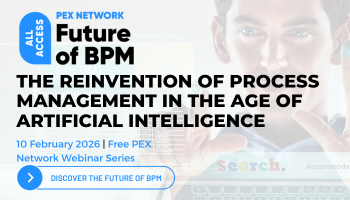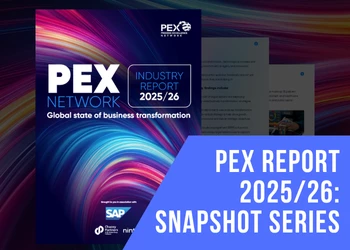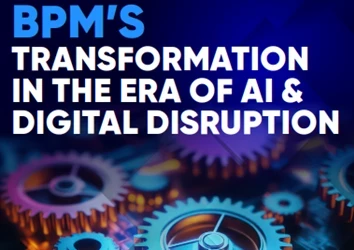Are Peter Drucker’s principles still relevant?
Gain insight into the management guru's lasting impact by considering unforgettable quotes on BPM
Add bookmark
Peter Drucker is credited with being the father of modern management principles. He passed away in 2005, but his impact continues to be felt. Drucker's focus on leadership, keeping people at the core of business and carefully innovating with technology are timeless values.
Join the PEX Network community

Don't miss any news, updates or insider tips from PEX Network by getting them delivered to your inbox. Sign up to our newsletter and join our community of experts.
Learn MoreRecently, without realizing it, speakers at PEX Network's All Access: BPM webinar series sounded a lot like Drucker. Recognize his influence in their commentary.
Put people first
Drucker valued ‘knowledge workers’ before it was a widely used term. He felt creative people should be the center of an organization. People before processes is essentially the mantra.
“There's a misalignment between people, process and technology. This is different for every organization, but this is actually a good representation of how most organizations function. There's too much focus on technology and not enough focus on people,” says John Santic, director of product marketing at Celonis.
In addition, Drucker believed processes were essential to arriving at positive outcomes.
“If you think about that for a moment, whether we’re launching a new product or onboarding a customer, or even just having a meeting, we follow steps consciously or not...everything is a process,” adds Maarten van der Borden, customer transformation director and digital transformation strategist at Celonis.
Watch the conversation on mindful BPM
Be transparent
Another priority for Drucker was clear and transparent communication. Keeping people informed is key to building human-centric organizations.
“BPM aims to realign your organization’s resources from strategy all the way down to execution. You want to have that in a single source of truth,” says Caspar Jans, principal BPM specialist at Celonis. Jans features in PEX Network’s 25 operational excellence thought leaders to follow in 2024 list.
Being thoughtful about the technology in which an organization invests is in sync with Drucker's focus on efficiency and productivity.
“We look for a workflow automation tool that could support complex or bespoke departmental business processes, especially when dealing with so many people on one essential process,” says Laurent Kelly, intelligent automation (IA) developer, Blackpool Teaching Hospitals NHS Foundation Trust.
Empower people to do their job
Drucker also aimed to empower the workforce and help them achieve their goals.
“We believe in empowering transformation across all departments by giving people back time...and that adoption is widespread because who doesn’t want to get on board with that?” says Alison Brannigan, process expert at FlowForma.
Watch the conversation on applying data to decision-making
Long before purpose in one’s work was a priority, Drucker emphasized the need for meaning in people’s roles and employee engagement.
“Success is not the key to happiness. Happiness is the key to success. If you love what you are doing, you will be successful,” says Alex George, CEO of ProcessMaker.
Again, tools must be used to help people have an easier time reaching their goals, according to Drucker.
“More tools don't always make us more productive. They can actually constrict our systems even tighter,” warns Sam Merrill, manager product strategy at Appian.
Watch the conversation on BPM in finance
Get all the information to make decisions
Drucker made informed decision-making a structured part of strategy. Data is an important ingredient in drawing conclusions and making predictions.
“Higher data quality means that you get better results from analytics. It means you get better results from AI. It means your reporting is better – again, improved decision-making,” says Andrew Hayden, principal product marketing manager at Precisely.
Create a culture of continuous improvement
Members of the PEX Network community prioritize a culture of continuous improvement. The idea is to evolve by always looking for ways to solve problems and becoming more detail-oriented.
“One key thing to understand about digital transformation is that there is no end state to it. We will always be doing some form of digital transformation. It’s evolutionary in so many ways,”.
Balancing tools with talent and harnessing technology to become more efficient is one of Drucker's pieces of advice.
“Things like resistance to change do go such a long way to impacting these sorts of initiatives, and certainly the success of investments as well. Technology is so important, but that people-focused change management piece is key too,” says Michael Hill, editor of PEX Network.
Track KPIs
Keeping track of results and measuring progress are among the many principles Drucker often espoused.
“I always think of the parallels between the software development industry that I'm a part of, and sort of this whole space where really the recipes are the same...understanding processes and identifying KPIs and cost structures, cycle times – modeling things in the abstract but also managing requirements before you decide to automate,” says Randy Grohs, chief architect at Nintex.
Leadership creates the path to improvement and efficiency. Senior executives must show committment and set the standard for others with a top-down approach, Drucker believed.
“The first question that I would ask is if top management fully invested in the process and if the improvements connect with the strategic objectives of the organization,” says Debashis Sarkar, managing partner at Proliferator Advisory and Consulting.
Watch the full session on AI in BPM
Tech should be a tool for talent
Drucker stressed that people must be at the center of processes and improvements. Therefore, they come before the tech and resources available to them.
“Changing how I work is more important than changing the tools with which I work,” sates J-M Erlendson, global evangelist at Software AG.
Being open-eyed and considering analytics can help leaders make better decisions and solve real problems.
“You can’t fix what you can’t see,” adds Aaron Adsit, vice-president of sales at GBTEC.
Believers in Drucker’s ways aim to be intentional and thoughtful in processes and decision-making.
“You have to slow down to speed up,” says Mahsh Rosario, office process manager at Cummings Electrical.
Keeping people at the center of an organization, Drucker-style, means AI is a tool for supporting ang augmenting humans.
“At the end of the day, we like to think of it as the orchestration of work. Every organization has a myriad of complex processes that really make up what they do day-to-day, and that work is not just being done by human workers but also increasingly by AI,” says Brad Hairston, advisory alliance director at SS&C Blue Prism.
Watch the session on the importance of process programs in BPM
Get everyone on the same page
Empowering employees means giving them choice sometimes.
“Amazon Bedrock provides the choice of industry-leading foundational models from model providers like Cohere, Anthropic and Amazon models available via a single API. With Amazon Bedrock, you can easily build and scale generative AI applications and access foundational models from different model providers,” according to Chavi Gupta, partner solutions architect at AWS.
Another way to empower people is to break out of silos, leverage transparency to ensure everyone is on the same page as per Drucker's principles.
“There is a gradual shift in terms of how applications get developed from a traditional IT house towards business developers who are now building applications. It is super important, if you are an organization with a lot of developers who are in the business divisions, to empower them. We need to enable them,” says Narendran Thillaisthanam, CTO at WNS-Vuram.
Drucker was ahead of his time in linking employee experience to customer experience. He believed that everything should feed into improved relationships with customers.
All Access: Future of BPM 2026

You asked, and we listened. Business process management (BPM) remains the cornerstone technology for driving organizational transformation, according to the survey results featured in the latest PEX Report. As we look toward 2026 and beyond, generative AI, agentic AI, and intelligent process orchestration are redefining how processes are designed, executed, and optimized. BPM is your key to adapting swiftly and effectively in this new era.
PEX Network is bringing together industry leaders, technology innovators, and thought leaders to answer your biggest questions and explore the advancements reshaping business today. And you're invited. Register for free to save your spot now!
Register Now













